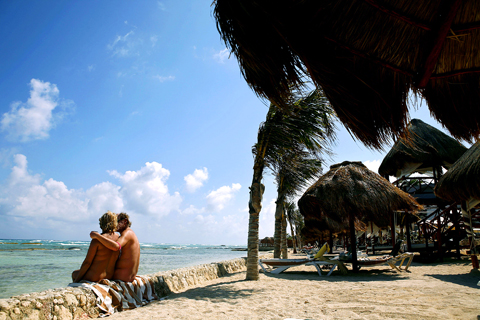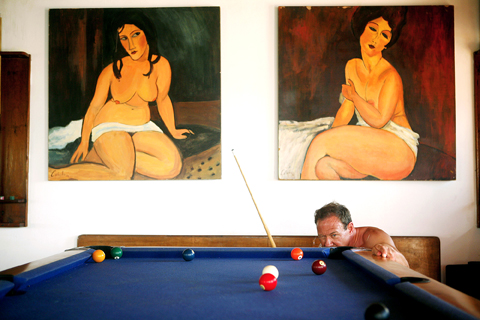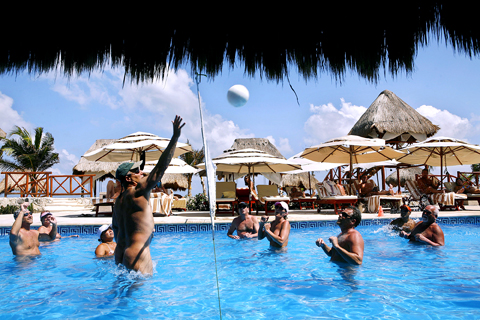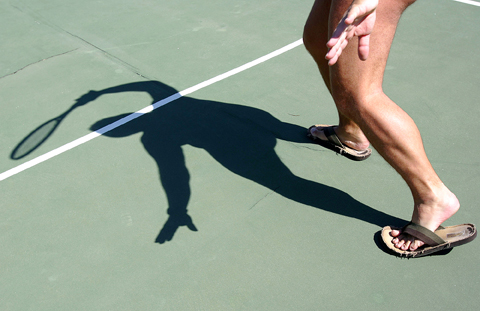When Larry Massa says he likes to travel light, he means it. No need for a jacket and tie at dinner, a pristine set of tennis whites when he hits the court or even a bathrobe to wear when heading from his hotel room to the pool or the spa.
For when Massa, 74, a retired Navy commander and computer science engineer from Virginia Beach, Virginia, and his wife, Darlene, go on vacation, they do it in the nude. “If you haven’t tried it, there’s no way I can tell you what a fun thing it is, what an added dimension to a vacation it can be,” said Larry Massa, who has been taking “clothing-optional” vacations since 2001 and whose most recent trip was to an all-nude resort in Mexico. “I’ll never forget the day,” said Massa, recalling the couple’s first nudist vacation at a Caribbean resort. “The place was full. We went to the far end of the pool and Dar said, ‘I’m going to take my top off.’ I thought I’m not going to wear these stupid swim trunks in the pool. So I jumped in naked. She looked down at me and dropped her bottoms and we never looked back.”
To many, the mention of a nudist resort conjures up images of isolated beach colonies with volleyball courts, hippie-style gatherings in a secluded campground or RV parks tucked away in the woods for vacationers who still talk reverently about the Summer of Love.

PHOTOS: NY TIMES NEWS SERVICE
And while those kinds of offerings still exist for Massa and his fellow naturalists, as they prefer to be called, the real boom in nude vacations is coming at the high end of the business, as upscale hotels and resorts, and even some luxury cruise lines, have begun to see the economic potential in the no-clothes crowd — particularly those who want to shed their clothes but not their pampered lifestyles.
The US$300-a-person all-inclusive Hidden Beach Resort, a nude-only luxury hotel that opened in 2003 along Mexico’s popular Mayan Riviera, greets guests with champagne upon arrival. Rose petals are tossed on the beds at turndown, and beach butlers hand out towels and reading materials to guests relaxing in the nude, while they themselves walk around in discreet uniforms of buttoned-down shirts and khaki pants.
Sea Mountain Inn, a two-year-old nude resort and spa in Desert Hot Springs, California, with room rates ranging from US$269 to US$900 a night, features Asian-influenced rooms with Egyptian bed linens, flat-screen TVs and natural mineral water pumped into the shower. The upscale Occidental Grand Fuerteventura in the Canary Islands has set aside entire blocks of rooms exclusively for nude guests. And several mainstream hotels, including Caesar’s Palace and the Mirage in Las Vegas, have introduced topless pools in the past couple of years.

PHOTOS: NY TIMES NEWS SERVICE
Even in the vacation home market, a new clothing-optional condo-resort, Mira Vista in Marana, Arizona, is selling more than a hundred two-bedroom condominiums, priced from US$244,500.
Last year, nude recreation represented a US$440 million industry — up from US$400 million in 2001 and US$200 million in 1992 — and it’s still growing, says the American Association for Nude Recreation, which promotes au natural vacations as “nakations.” According to the association, roughly 20 percent of members have a median household income of US$106,000, drive luxury cars and spend US$3,000 or more on travel.
The types of nude vacations have expanded too. Vacationers can now roll out a mat at all-nude yoga retreats, share banana bread with other guests at all-nude bed-and-breakfasts, gear up for nude mountain biking in California’s High Desert and saunter around the decks of cruise ships chartered specifically for clothing-free travel. In Germany, a travel operator has arranged for an all-nude charter flight this summer to take customers to a clothing-optional retreat in the Baltics. The naturalists will take off and land fully clothed, but shed their clothes once airborne. (Flight attendants and crew will, however, keep their uniforms on.)

PHOTOS: NY TIMES NEWS SERVICE
SpaFinder.com, an online spa search engine, recently created a separate category for “nudist spa vacations” after noticing an increase in searches for the term. Since November, searches on SpaFinder.com for such trips have averaged about 720 a month — beating out “pet-friendly spas” (284) and “waxing services” (298).
“It’s no longer just a grass-roots, nuts-and-sweets kind of thing,” said Nancy Tiemann, president of Bare Necessities, which specializes in nude travel and is offering a seven-day Greek cruise in September, along with four others this year and next. Four months ago, Teimann’s company began selling an all-nude 2010 Hawaiian cruise on Celebrity Cruise Line’s Constellation, a 2,000-passenger ship. Already, about 90 percent of the ship is booked.
When the company, which she owns with her husband, Tom, began chartering small ships for all-nude cruises in the early 90s, she said many mainstream cruise operators dismissed them as a joke. “Now,” Tiemann said, with perhaps a touch of hyperbole, “they’re trampling each other to get our business.”

PHOTO: NY TIMES NEWS SERVICE
Most nude vacationers say that what they enjoy most is liberation from the typical pretenses of society. “When you don’t have any clothes on, you don’t know if someone’s a judge or a doctor, or a lawyer or a mechanic,” said Larry Massa. “You are what you are.”
But no matter how popular and upscale nude resorts become, one social convention is unlikely to change: Nudity and family vacations don’t always mix.
Just ask the Massas. They simply can’t convince their children, all in their late 40s, to join them on their two or three trips a year.
On vacation at the Couples Negril resort in Jamaica, which has a nude beach in addition to what she refers to as a “prude” beach, Darlene Massa said she casually mentioned to her son and daughter-in-law that she was going to check out the nude side.
“Mom,” replied her son, “I don’t want to see you naked.”

The unexpected collapse of the recall campaigns is being viewed through many lenses, most of them skewed and self-absorbed. The international media unsurprisingly focuses on what they perceive as the message that Taiwanese voters were sending in the failure of the mass recall, especially to China, the US and to friendly Western nations. This made some sense prior to early last month. One of the main arguments used by recall campaigners for recalling Chinese Nationalist Party (KMT) lawmakers was that they were too pro-China, and by extension not to be trusted with defending the nation. Also by extension, that argument could be

Aug. 4 to Aug. 10 When Coca-Cola finally pushed its way into Taiwan’s market in 1968, it allegedly vowed to wipe out its major domestic rival Hey Song within five years. But Hey Song, which began as a manual operation in a family cow shed in 1925, had proven its resilience, surviving numerous setbacks — including the loss of autonomy and nearly all its assets due to the Japanese colonial government’s wartime economic policy. By the 1960s, Hey Song had risen to the top of Taiwan’s beverage industry. This success was driven not only by president Chang Wen-chi’s

Last week, on the heels of the recall election that turned out so badly for Taiwan, came the news that US President Donald Trump had blocked the transit of President William Lai (賴清德) through the US on his way to Latin America. A few days later the international media reported that in June a scheduled visit by Minister of National Defense Wellington Koo (顧立雄) for high level meetings was canceled by the US after China’s President Xi Jinping (習近平) asked Trump to curb US engagement with Taiwan during a June phone call. The cancellation of Lai’s transit was a gaudy

The centuries-old fiery Chinese spirit baijiu (白酒), long associated with business dinners, is being reshaped to appeal to younger generations as its makers adapt to changing times. Mostly distilled from sorghum, the clear but pungent liquor contains as much as 60 percent alcohol. It’s the usual choice for toasts of gan bei (乾杯), the Chinese expression for bottoms up, and raucous drinking games. “If you like to drink spirits and you’ve never had baijiu, it’s kind of like eating noodles but you’ve never had spaghetti,” said Jim Boyce, a Canadian writer and wine expert who founded World Baijiu Day a decade